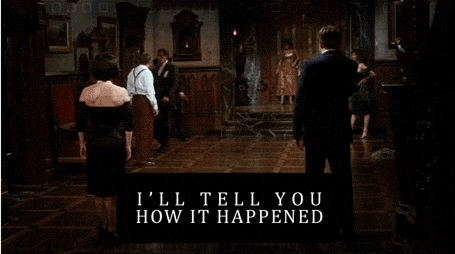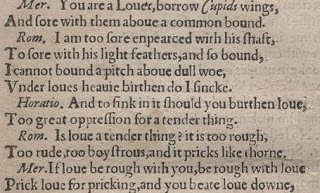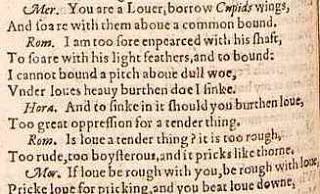Romeo can’t really be blamed for Ophelia’s death.
Senior English major on a Shakespeare final. (via minininny)
WELL THEY’RE NOT WRONG
——
How about this, though?

[Editorial Note: This “theory” depends on believing the Romeo and Juliet and Hamlet take place contemporaneously. So, for the sake of argument, let’s all agree that the events of both plays occur in the Spring of 1517 (chosen because of Martin Luther’s 95 Theses, and the Reformational threads that run through Hamlet).]
See, in the Second Quarto and First Folio versions of Romeo and Juliet, a[n extremely minor] character appears with Romeo, Mercutio, and Benvolio at the Capulet’s Party (where, if you recall, Romeo meets Juliet for the first time).
Like Hamlet’s Horatio, this Horatio is full of well-worded philosophical advice. He tells Romeo “And to sink in it should you burden love, too great oppression for a tender thing.”

Fig. 1 – Second Quarto Printing

Fig. 2 – First Folio Printing
[The American Shakespeare Center’s Education Blog discusses the likely “real” reasons for Horatio’s presence]
Let’s imagine that Horatio has travelled down from Wittenberg (about 540 miles) to Verona for his Spring Break. He hears about some guys who like to party (because, let’s be honest, besides getting stabbed, partying is Mercutio’s main thing). So, he ends up crashing the Capulet’s ball with them.
He is then on the sidelines as Romeo and Juliet fall in love, Tybalt kills Mercutio, Romeo kills Tybalt, Romeo gets banished, and both lovers are found dead in Juliet’s tomb.
This tragedy fresh in his mind, he returns to Wittenberg at the end of what has turned out to be a decidedly un-radical Spring Break and discovers that his bestie Prince Hamlet is leaving for Elsinore Castle because he’s just gotten news that his father, the King, is dead.
On the trip up (another ~375 miles), Horatio recounts the tragic romance he just witnessed in Verona. He advises (as he is wont to do) Hamlet not to mix love and revenge.
Hamlet takes Horatio’s advice to heart, breaking up with Ophelia so that he can focus is energy on discovering and punishing his father’s killer:
HAMLET
Ay, truly; for the power of beauty will sooner
transform honesty from what it is to a bawd than the
force of honesty can translate beauty into his
likeness: this was sometime a paradox, but now the
time gives it proof. I did love you once.
You should not have believed me; for virtue cannot
so inoculate our old stock but we shall relish of it: I loved you not.
Ophelia – burdened by the perceived loss of Hamlet’s love and his murder of her father – goes mad and drowns herself.
You see, if Romeo had waited literally a minute and thirty seconds longer (31 iambic pentametrical lines) – he, Juliet, Ophelia (and possibly the rest of the Hamlet characters) would have made it.
* With thanks to roguebelle.
(via thefeminineending)

Buncha fuckin nerds in this town.
(via moriartini)
